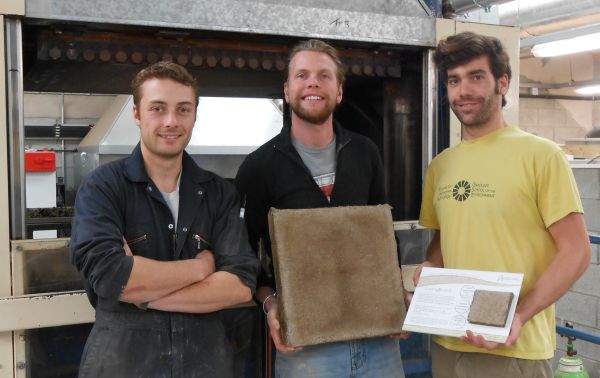- Centre Home
- About us
- Products & Services
- Biorefining Tech Transfer Centre
- IPPS
- News and Resources
- News archive 2019
- News archive 2018
- News archive 2017
- News archive 2016
- News archive 2015
- News archive 2014
- News archive 2013
- News archive 2012
- News archive 2011
- News archive 2010
- News archive 2009
- News archive 2008
- News archive 2007
- News archive 2006
- Publications and reports
- Mould Training School
- FAQs
- Annual Reports
- Links
- Contact Us

The BC offer is a broad one, encompassing products and services for a wide range of industries at every stage of the evaluation, research, product development, product trial and manufacturing processes.
News Archive: 2014
December 2014
NEW BOOK PUBLISHED - 'CHEMICAL PROCESSES FOR A SUSTAINABLE FUTURE'
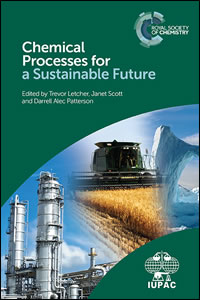
Prof Ray Marriott from BC has contributed a chapter in a new book ‘Chemical Processes for a Sustainable Future.’
The book, published by the Royal Society of Chemistry, is about chemical processes aimed at sustainability with a focus on developments in new technologies and on processes using renewable materials as chemical feedstocks. The chapters give an up-to-date account of some of the new processes that are either currently in operation or are planned for the future. The overarching theme is to showcase new ideas in the chemical industry related to a sustainable existence.
Within this book Prof Ray Marriott’s chapter on 'The Application of Supercritical Carbon Dioxide Extraction of Functional Compounds' describes how sub-critical and supercritical carbon dioxide can selectively extract target molecules from complex raw materials often avoiding lengthy and costly purification steps. Many of these raw materials are themselves sustainable plant products or waste streams leading to integrated, sustainable and economic manufacturing with carbon dioxide providing the ideal process solvent.
For more information and to purchase this book please follow this link to the Royal Society of Chemistry book publications. RCS book publication: Chemical Processes for a Sustainable Future
BC JOINS WELSH MISSION TO CHINA
Adam Charlton joined Prof Dave Chadwick (SENRGy) to represent Bangor University as part of a Welsh Government mission to Beijing to the Beijing Capital Agri-Business Group (30th Nov – 2nd Dec 2014). The group included David Morris (Deputy Director Food and Market Development Division) and Fuling Li (Sector Manager, Foreign Direct Investment), both from the Welsh Government, together with Prof Mike Gooding (Director of IBERS), Dr David Lloyd (Director of the Food Industry Centre, Cardiff Metropolitan University).
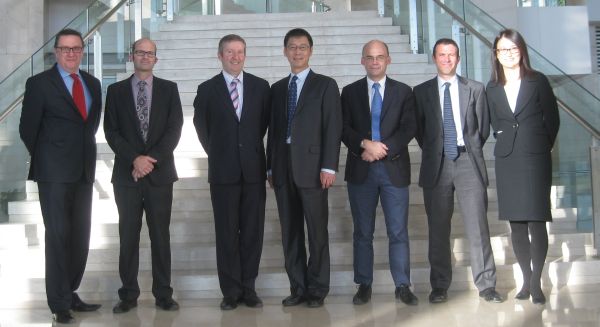
The visit was designed to promote the strength of Wales’ R&D in Food Supply Chain; to enhance the close collaboration between Welsh scientists and Chinese food industry and academia; help Chinese business to understand Wales’ investment environment and to attract investment from China and maximize cooperation opportunities.
During the trip presentations were given to Industry and Academics at COFCO Corporation (Sanyuan Foods Headquarters and Research Centre). The group visited Dairy Farms, Milk Processing and Feed Processing factories and had a meeting at the State Administration of Foreign Expert Affairs. The group also have a chance to visit the Great Wall of China.

November 2014
STARS GRASS PACKAGING ON DISPLAY AT WAITROSE
Prototype green packaging, developed as part of the STARS project, was on display at Waitrose, Menai Bridge on 18th November 2014
The STARS project, funded with support from the Welsh Government through the A4B scheme, is a collaborative project led by the BioComposites Centre at Bangor University, in partnership with Aberystwyth University and several industrial partners including Waitrose.
Packaging made from grass can be easily composted with food waste, providing an environmentally beneficial alternative to the tons and tons of plastics that are used in supermarkets today.
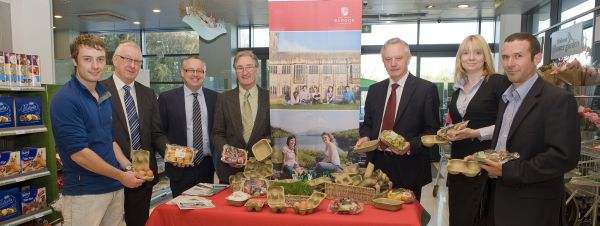
Dafydd Roberts, BC; Derek Davies, Adare; Quentin Clark, Waitrose; Nick Laflin, BC; Professor John G. Hughes VC, Bangor University;
Samantha Williams, Welsh Government and Dr Adam Charlton, BC.
The Waitrose store hosted a display showing a variety of food items packed in the grass packaging product range, which currently includes food trays, fruit punnets and egg boxes. Shoppers were asked to comment on the product range thereby providing valuable feedback for the project. All the packaging on display was made using the new pulp moulding machine, supplied by Adare and located at the BioComposites Centre’s Biorefining Technology Transfer Centre, Mona, Anglesey.
Quentin Clark, Head of Sustainability and Ethical Sourcing, Waitrose said: "Waitrose has been very pleased to have been involved with this work for a number of reasons. Obviously, the opportunity to explore novel ways to create more sustainable materials, such as packaging, holds its own attraction but this has been a great demonstration of a more open approach that shows how academia and business can work together, each contributing their expertise, to help deliver real, practical science to the market"
Bangor University’s Vice Chancellor, Professor John G. Hughes said: “The Biocomposites Centre at Bangor has a strong track record of working collaboratively with companies in Wales in order to commercialise sustainable products. Bangor is proud to be part of this very exciting project and we look forward to seeing the collaboration develop as part of the University’s commitment to Wales and local business.”
October 2014
BEACON INVITED SPEAKERS AT 3rd BIOECONOMY STAKEHOLDERS' CONFERENCE
The BEACON project received an invitation to present at the recent 3rd Bioeconomy Stakeholders' Conference, Turin, October 8 and 9, 2014. The theme of the conference session was ‘Connecting the biomass: illustrating the bioeconomy system in action by following the flows of biomass and residues’ and BEACON was presenting as a Regiostars 2014 winner.
Attending and presenting were Adam Charlton (Bangor University), Mike Morris (Aberystwyth University) , Steve Kelly (Swansea University) and Quentin Clark from Waitrose who provided an insight into sustainability from the retail sector
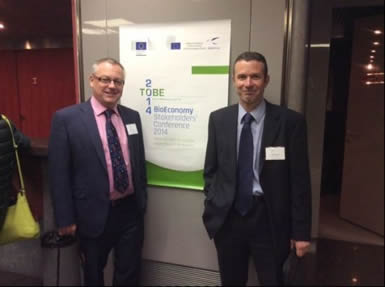
Quentin Clark, Head of Sustainability and Ethical Sourcing at Waitrose
and Adam Charlton, BC at the 3rd BioEconomy Stakeholders Conference 2014
September 2014
PhD STUDENT SUCCESSFULLY DEFENDS THESIS
Md Ashaduzzaman passed his viva and handed in the final copy of his PhD thesis. The work investigated the use of bio-resin to modify wood for the improvement of physical, mechanical and decay resistance properties. A bio-based resin system was developed by ozonolysis process from the cashew nut shell liquid (CNSL) a natural, plant derived, renewable material composed of different phenolic constituents. The distribution of the CNSL resin into the modified woods were investigated using light microscopy and FTIR analysis.
Ashad, was joint supervised by Graham Ormondroyod (BC) and Mike Hale (SENERGy) with help from Morwenna Spear (BC) on DMTA testing and Viacheslav Tverezovskiy (BC) on the use of CNSL.
LIMNet ASSISTED COMPANY UK FINALIST IN EU COMPETITION
ADAPTAVATE, a new UK start-up company, is developing new low carbon bio-based building materials and products. They approached BC and through the LIMNet project received assistance to promote the technology by entering the Climate-KIC EU CleanLaunchpad competition. After stiff competition in the UK National final on the 24th September it was announced on 30th September that will be one of the UK representatives at CleanLaunchpad Grand EU Final on 20th October in Valencia (Spain). ADAPTAVATE's first product is a low carbon alternative to plaster board. One million tonnes of plasterboard goes into landfill in the UK. The new product is a low carbon, bio-based breathable material with twice the thermal properties of existing products. Tom Robinson, of ADAPTAVATE, has been working recently at BC's Biorefining and Technology Transfer Centre (BTTC) to develop the product. See CleanLaunchpad for further details about the competition.
BC attended a meeting in Bilbao Spain, on 17th September, to discuss the latest research on the ECO-SEE (http://www.eco-see.eu/) project into improving indoor air quality by modifying panels and insulation. Partners from around the UK and Europe shared their progress at the 12 month stage of the four year project and also introduced the project to a select audience of interested stakeholders ranging from academics to architects. The meeting was also the ideal opportunity for two of BC’s PhD students, Miss Bronia Stefanowski and Mr Elie Mansour, to present their work to an international audience of experts, which provoked interesting questions and discussion. For more information on the ECO-SEE project contact Graham Ormondroyd
SUPERCRITICAL CO2 ON PYTHAGORAS' TROUSERS
Prof. Ray Marriott appeared on Radio Cardiffs 'Pythagoras' Trousers' show on the 8th September 2014 at 9pm, to discuss the applications of supercritical CO2. The show takes a look at stories of interest from the worlds of science, technology, engineering and mathematics, bringing these fields to a wider audience and promoting these subject areas to school pupils. Listen to the podast of Ray on the radio in the first ten minutes of the show at the following link : Prof Ray Marriott - Pythagoras Trousers
July 2014
RESEARCH TO FIND NATURAL ORGANIC PESTICIDE
BC together with Bangor University's School of Biological Sciences has won grant funding from the Biotechnology & Biological Sciences Research Council (BBSRC)and the Technology Strategy Board (TSB) to develop a novel natural herbicide produced via an enzymatic route from an abundant natural oil and bring it to the market. The project team will work closely with two commercial partners - Almac and Hockley International - in product development. More information
2nd UK CONFERENCE ON SUPERCRITICAL FLUIDS
The 2nd UK conference on supercritical fluids was held in Bangor, 20-22nd July. The conference was well attended with speakers and delegates coming together from a wide range of countries including UK, Europe, Russia and Venezuela. The conference themes covered extraction, fractionation, reactions, partical formations and technological applications of supercritical fluids. Keynote presentations to all themes were well received by delegates. One delegate commented "I liked the mulitdiscipline content and the connection with industry". During the breaks there was time to visit the exhibitors stands to see and discuss the the latest technologies for supercritical fluid applications. There was also an opportunity to visit the CO2Lab. To see photos of the conference click here (pdf). We would like to thank everyone who took part in this conference for making it such a fantastic success.

BC WINS BEST BUSINESS IMPACT AWARD
BC has won an Impact and Innovation award for the second year in a row, this time in the category 'Best Business Impact'. The award, given by Bangor University, was for recognition of the achievements of work carried out by BC to reduce plastic packaging in the food industry. Reseach work funded by the Technology Strategy Board sucessfully developed fibre-based pizza disks to replace the polystyrene disks currently used. About 200 million pizzas sold in the UK each year, so the introduction of plant-based biodegradable disks will have a major impact on the environment.
The new fibre based products satisfy strength, flexibility, thickness and water resistance and food contact requirements. They are biodegradable and home compostable and have an improved Life Cycle Assessments compared to expanded polystyrene (EPS), and are commercially viable.
The prototype uses waste straw from the Co-Op’s farms, and has undergone food safety assessment and customer preference surveys. Research partners ValueForm Ltd are now commercialising the packaging with the UK’ largest manufacture of pizzas.
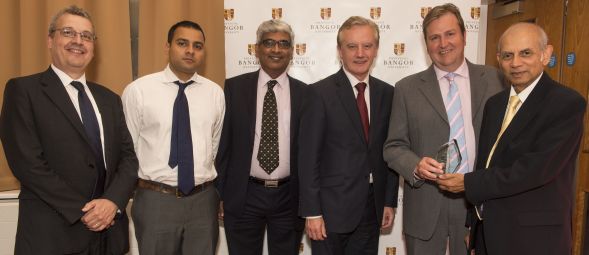
Left-right: Prof David Shepherd, Pro Vice Chancellor who introduced the Award; Jaydeep Korde, ValueFormLtd; Prof Keshavan Niranjan, Reading University; Vice Chancellor, Professor John G Hughes; Rob Elias, BioComposites, Prakash Korde, ValueForm Ltd
June 2014
NEW BC BROCHURE
A new BC brochure detailing the pilot scale capabilities at the scale-up and product development facility based on Anglesey has been produced. Read "The Biorefining Technology Transfer Centre" brochure to find out about our latest equipment acquisitions and processing technologies available. We may be able to help with your business solutions!
April 2014
On the 24th April, the BioComposites Centre attended the general assembly of Innovawood (http://www.innovawood.com) for the first time.
InnovaWood is an umbrella organisation that integrates four European networks in the Forest, Wood-based and Furniture industries into a more effective mechanism to support innovation in these sectors. The overall aim of InnovaWood is to bring business benefit to the forestry, wood and furniture chain by providing a forum for member organisations to contribute more effectively to the development of the Forest Wood Chain. In particular they seek to support the use of innovation, research, training and education as tools for increasing the competitiveness of European industries in line with the general policies of the European Union.
Dr Graham Ormondroyd, who attended the GA commented ‘The Innovawood network offers a great opportunity to strengthen our links with the European timber research and teaching community and offers us a chance to bring together strong consortia for new state of the art projects’.
To become a member of Innvawood, contact the secretariat at office@innovawood.com and mention the BioComposites Centre.
March 2014
Dr Adam Charlton on RegioStars and the BioComposites Centre:
Impact of BEACON acknowledged by RegioStars Award 2014:
CONGRATULATIONS TO BEACON
BEACON is the winner of the prestigious European Commission RegioStars Award 2014. This is fantastic recognition of the great achievement and impact of the project. Initially 19 finalist were chosen from 80 projects supported by EU Cohesion Policy funds on the basis of four key criteria: innovation, impact, sustainability and partnership.
Led by Aberystwyth University’s Institute of Biological, Environmental and Rural Sciences (IBERS), BEACON was one of 4 projects to be shortlisted in the “Sustainable growth: Green growth and jobs through Bio-economy” category. Researchers at BEACON work with industry, including small and medium sized enterprises, to develop renewable materials, fuels and chemicals as well as modified and new environmental and economically sustainable processes. Dr Adam Charlton, from BC, members of the partner universities, and Finance Minister Jane Hutt, were at the ceremony in Brussels on 31st March 2014. Welsh Government Finance Minister Jane Hutt said: “This is an excellent example of how EU projects are delivering in Wales through ground-breaking research and innovation which is helping to drive our economy and global competitiveness. This also demonstrates the importance of EU membership to Wales and the benefits of EU Funds to people across the region.” Read more (Bangor University news item)..
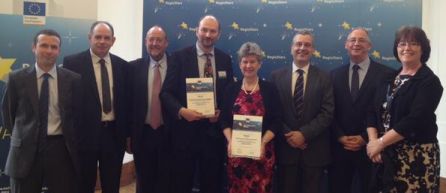
BANGOR SCIENCE FESTIVAL
The BioComposites Centre took part in the Bangor Science Festival, 14th - 23rd March, as part of the National Science and Engineering Week. A broad range of materials, which BC has been involved with research and development work, were on display, for example, fibre reinforced plastics, biobased resins and plastics, natural food additives (eg from seaweed), natural insulation batts and rolls and engineered timber. The event was well attended by the public and school groups from the North Wales area.
BEACON CASE STUDY BOOKLET LAUNCHED AT BIOWALES 2014
At a business breakfast held during UK Climate Week [3-9 March] an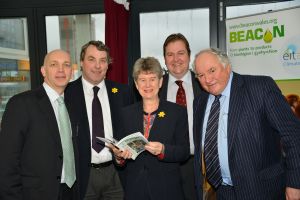 d BioWales 2014, Finance Minister Jane Hutt launched a publication, ‘Progress through Partnership’, which highlights some of the innovative collaborations undertaken by the BEACON project. The project aims to reduce reliance on fossil fuels by developing new, sustainable products and services from plants using a process known as biorefining. The case study booklet highlights some of the innovative collaborations underway including, developing mushroom extract as a food supplement, using the properties from daffodils to treat Alzheimer’s and the identification of plant sugars for use in healthy living products. the work of companies and Universities in helping to establish Wales as a Biorefining Centre of Excellence.
d BioWales 2014, Finance Minister Jane Hutt launched a publication, ‘Progress through Partnership’, which highlights some of the innovative collaborations undertaken by the BEACON project. The project aims to reduce reliance on fossil fuels by developing new, sustainable products and services from plants using a process known as biorefining. The case study booklet highlights some of the innovative collaborations underway including, developing mushroom extract as a food supplement, using the properties from daffodils to treat Alzheimer’s and the identification of plant sugars for use in healthy living products. the work of companies and Universities in helping to establish Wales as a Biorefining Centre of Excellence.
**Read more (BEACON Blog) ** (Photo courtesy of Antony Pugh). **Read more (Case Study Booklet pdf)**
COST ACTION TRAINING SCHOOL AND WORKSHOP
The Biocomposites Centre hosted a two day training school on the 3rd-4th March 2014, under COST action 1205 – Innovative application of regenerated wood cellulose fibres. The training school focused on the use of cellulose in industrial film applications and attracted PhD students and early career researchers from nine participating countries. Following a keynote presentation by Dr Magnus Gimåker from Innventia Sweden, on the manufacture of nanofibrillated cellulose, the delegates were shown how to incorporate cellulose into films, using the pilot scale film extrusion line, at the Biocomposites Centre Transfer Technology Centre at Mona. The trainees then analysed the films using a number of differing analytical techniques – Thermal properties (by Dr Morwenna Spear), Mechanical and Barrier properties (by Dr Qiuyun Liu), Light and Electron microscopy (by Dr Simon Curling) and Colour and Optical properties (by Dr Graham Ormondroyd).
BC are part of a consortium working on a new EU FP7 project looking to improve the indoor environmental quality of energy efficient buildings through the use of innovative eco-materials that will not only contribute to improved indoor spaces but also have lower embodied energy and carbon compared to existing solutions. The
ECO-SEE project results will be applicable to newly built and renovation projects. The ECO-SEE project results will be applicable to newly built and renovation projects. For more information see **Project flyer**
LIMNET WORKSHOP - SMART MATERIALS: OPPORTUNITIES FOR YOUR BUSINESS
A workshop, on Monday 31st March 2014, in Carnarfon, Gwynedd, will give an overview of smart materials in general and then more specifically look at the use of smart materials in textile related products. The workshop is part of the Low Impact Materials Network (LIMNet) which will provide a review of current activity and opportunities within Wales on smart materials.
The following speakers have been confirmed:
Dave Taylor – Smart Clothes and Wearable Technology Centre
Steve Morris – Smart Materials, Knowledge Transfer Network
Charles Ross – Performance Sportswear Design, Falmouth University
Contribute a presentation
There is also the opportunity to contribute to the workshop by giving a 3-5 minute presentation about your company. Limited space is available to display samples. If you would like to take part in this workshop please contact Ceri Loxton at c.loxton@bangor.ac.uk
For more information see **workshop flyer**
February 2014
BC is involved in a new A4B (Academia for Business) Knowledge Exchange Partnership funded by the Welsh Government. LIMNET, the Low Impact Materials Network, covers the following different sectors, smart and biomimetic materials, 3D printing and fabrication and building and construction. LIMNet is a partnership of three Welsh academic institutes; the BioComposites Centre at Bangor University, Swansea University and the University of South Wales.
LIMNet aims to identify opportunities for growth and collaboration within and between these sectors both for academic institutes and companies within Wales. The network aims to build capacity by forming collaborations and seeks to identify project partners for research through Technology Strategy Board calls and Horizon 20/20 bids. The project will hold workshop events, provide 'free' company assistance, offer student and graduate placements and produce a review of the sector at the end of the project. For further information please contact Ceri Loxton at c.loxton@bangor.ac.uk LIMNET flyer.
BEACON LIFE CYCLE ANALYSIS SEMINAR
The 2nd BEACON life cycle analysis and process optimisation seminar was held at Bangor University on Tuesday 25th February. Guest speakers included David Styles, LCA lecturer at the university, and James Nash, Biomass and Renewables Manager at Spencer Environmental Care Associates (www.spencereca.com). The free half-day event was well attended and attracted a good mix of Welsh business professionals and early-career researchers. If you would like to find out more about how LCA and techno-economic analysis can be applied to your business, then please check this website for details of our 3rd event which will be held in Swansea in June.
**Event flyer and programme.**
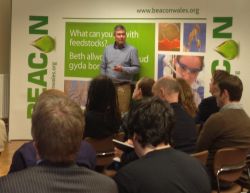
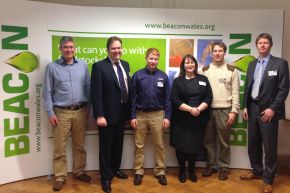
ARTICLE IN WOOD BASED PANELS INTERNATIONAL
BC feature in a three page spread in WBP International magazine as we mark our celebration of 25 years in business. The article features an overview of how BC was established in 1989 and gives a brief history of the Centre and its activities past and present. BC was one of the first businesses to carry out industrial research within Bangor University. A lot of the initial work at BC was centred around the pilot scale pressurised refiner was critical in allowing industry to test resin and wax formulations together with a huge range of raw materials for MDF production. The article goes on to discuss the current areas of research, expertise and capabilities and concludes that BC has made a positive contribution to the panel industry and will continue to do so in the years ahead. **See full article**
January 2014
SUPERCRITICAL FLUIDS CONFERENCE
It is now ten years since the first UK conference on supercritical fluids was held at Birmingham University in 2004 and many new applications have been developed since this event. This year also marks the 25th anniversary of the BioComposites Centre at Bangor University and we are therefore pleased to announce that we will be hosting a supercritical fluids conference on the 20th-22nd July 2014.
The conference will bring together both academic researchers and industry to promote the application of supercritical fluids and to identify new opportunities to replace traditional solvent based processes with cleaner and greener technologies.
The program will have four themes;
• Extraction and fractionation using supercritical fluids
• Reactions in supercritical fluids
• Particle generation
• Technological applications of supercritical fluids including cleaning, dyeing and impregnation.
Registration and a call for abstracts will open in February 2014.
The Welsh Insitute for Natural Resources (WINR) are currently advertising for a Research Officer. The position is based in the BioComposites Centre and will involve working closely with Bangor University Chemistry department. Duties will include supporting the research team and providing technical support to develop a biomass liquefaction reactor, and the use of the products of the reaction in chemical synthesis. Candidates should be educated to a PhD in Chemistry standard (or equivalent) and previous experience in designing and performing reactions in highly reactive conditions and processes involving multistep synthesis, and either synthetic chemistry or nature product synthesis, including working knowledge of standard analytical techniques (NMR) and of processes of separation and purification of molecules.
For further information click on job opportunities at : http://www.bangor.ac.uk/index.php.en
NREL RELEASE A NEW LAND USE MODEL
The National Renewable Energy Laboratory (NREL) in the USA has released a new land use model, BioLUC, aimed at modelling the effects of bio-feedstock production scenarios on global land use change. The model is released through the Github platform allowing open access to the wider research community and is anticipated to play a key role in driving forward our understanding of this area. Campbell Skinner of the BioComposites Centre visited NREL last summer and worked alongside the development team as they went through final testing stages of the project.
A site visit has been arranged for the Sustainable Buildings Breakfast Club, on 16th January, to view two properties being developed locally by Gary Newman, designed by Rachel Bevan Architects and being built by Williams Homes. These houses have been designed on a fabric first principle to Code level 4 using a timber frame, rendered wood fibre insulated cladding and insulated with flexible wood fibre batts.
The site is just outside Bangor – about 5-10 minute drive. The visit will begin at 9am for approximately 1 hour. Please contact us for more details.

